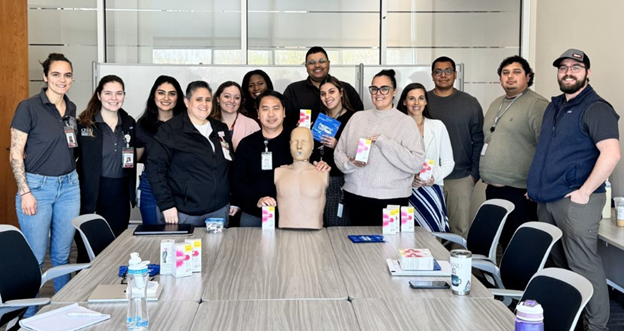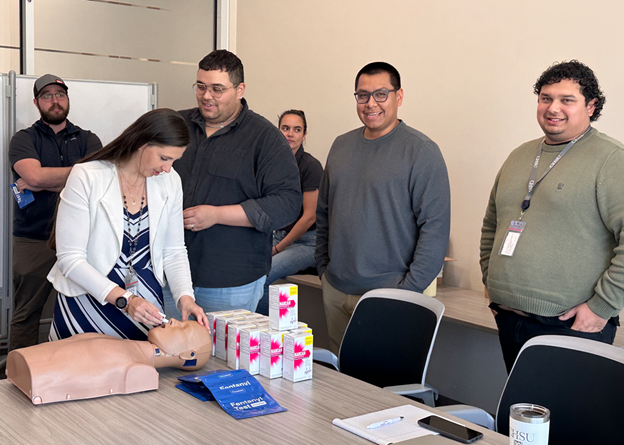OVERDOSE PREVENTION COMMITTEE TRAINS THE CHSU OFFICE OF STUDENT AFFAIRS ON HOW TO IDENTIFY AND RESPOND TO AN OPIOID OVERDOSE
February 14, 2025

Written by Mariya Leshchuk, CHSU-COM Class of 2027 Overdose Prevention Officer
On Tuesday, February 11, 2025, the Overdose Prevention Committee (OPC) hosted an on-campus opioid overdose and naloxone training workshop for the Office of Student Affairs at the California Health Sciences University College of Osteopathic Medicine. Over a dozen staff members were trained on how to administer naloxone on a manikin and effectively respond to an overdose.
The Class of 2027 OPC officers—Mariya Leshchuk, Aicha Naouai, Negin Fadaee, and Andrew Insco—delivered a presentation on recognizing and responding to an opioid overdose. The presentation covered key topics such as the pharmacology of opioids and naloxone, various sources of opioids, and symptoms of an overdose. The presentation culminated in a simulated overdose for attendees to practice identifying and responding to such situations effectively on OPC’s manikin, Anikin.

CHSU-COM has a Naloxone Policy in place that allows trained campus security, faculty, staff, and students to administer naloxone to anyone on campus in case of an emergency. The policy was established to permit CHSU-COM members to administer the lifesaving medication in case of an emergency when medical personnel are not immediately available. In line with this policy, the CHSU Office of Student Affairs play a key role in ensuring staff are trained and prepared to respond effectively. Naloxone is stored on campus in all first aid kits and can be obtained by contacting OPC, with no questions asked.
As part of OPC’s commitment to employing Harm Reduction strategies, staff were also educated on how to use Dosetest fentanyl test strips. Fentanyl test strips are a preventative measure intended to detect fentanyl-laced products and prevent individuals from unknowingly taking fentanyl and overdosing. In contrast, naloxone is a treatment measure intended to reverse opioid-induced cardiovascular collapse after an individual has overdosed.
By providing this training, OPC is creating a safer campus environment and equipping staff with the tools and knowledge necessary to act quickly in the event of an overdose. The Office of Student Affairs’ receptiveness to employing opioid overdose prevention and harm reduction strategies is an additional step toward safeguarding the well-being of the entire CHSU community.